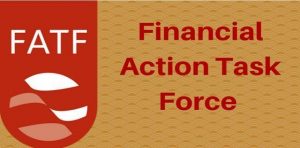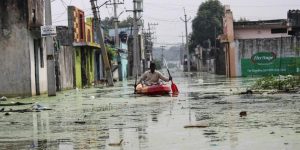Daily Current Affairs for Government Exams:
Today Current Affairs: 24th October 2020 for UPSC IAS exams, State PSC exams, SSC CGL, State SSC, RRB, Railways, Banking Exam & IBPS, etc
Table of Contents
Contents:
- International Labour Organization (ILO).:
- Personal Data Protection Bill, 2019:
- Forex Reserves:
- Standard Operating Procedure (SOP):
- The Financial Action Task Force (FATF):
- Project Snow Leopard:
- Flash Flood Guidance services:
- Other important current affairs:
1. International Labour Organization (ILO).:

After 35 years, India has assumed the Chairmanship of the Governing Body of International Labour Organization (ILO).
- Labour & Employment Secretary Apurva Chandra has been elected as the Chairperson of the Governing Body of the ILO for the period October 2020-June 2021.
- The Chairperson of the Governing Body of ILO is a position of international repute. The Governing Body (GB) is the apex executive body of the ILO.
- GB meets thrice a year, in March, June and November. It takes decisions on ILO policy, decides the agenda of the International Labour Conference, adopts the draft programme and budget of the organisation for submission to the conference, and elects the Director-General.
- The broad policies of the ILO are set by the International Labour Conference, which meets once a year in June, in Geneva, Switzerland.
- Chandra will be presiding over the upcoming Governing Body’s meeting, to be held in November 2020.
- It will provide a platform to apprise participants of the transformational initiative taken by the government in removing the rigidities of the labour market, besides making intention clear about the universalisation of social security to all workers in the organised or unorganised sector.
- The four codes on wages, industrial relations, social security and occupational safety, health and working conditions are expected to improve ease of doing business and safeguard the interest of workers.
International Labour Organization
- The only tripartite United Nations (UN) agency, since 1919, the ILO brings together governments, employers and workers of 187 member States, to set labour standards, develop policies and devise programmes promoting decent work for all women and men.
- The ILO became the first specialized agency of the UN in 1946.
The principal means of action in the ILO is the setting up the International Labour Standards in the form of
Conventions and Recommendations.
- Conventions are international treaties and are instruments, which create legally binding obligations on the countries that ratify them.
- Recommendations are non-binding and set out guidelines orienting national policies and actions.
- It received the Nobel Peace Prize in 1969.
- It releases the annual World Employment and Social Outlook (WESO) Trends report.
India and ILO:
- India, a Founding Member of the ILO, has been a permanent member of the ILO Governing Body since 1922. The first ILO Office in India started in 1928.
- India has ratified 41 Conventions of the ILO, which is much better than the position existing in many other countries.
- India has ratified six out of the eight-core/fundamental ILO conventions.
- These conventions are:
- Forced Labour Convention (No. 29)
- Abolition of Forced Labour Convention (No.105)
- Equal Remuneration Convention (No.100)
- Discrimination (Employment Occupation) Convention (No.111)
- Minimum Age Convention (No.138)
- Worst forms of Child Labour Convention (No.182)
- India has not ratified the two core/fundamental conventions, namely Freedom of Association and Protection of the Right to Organise Convention, 1948 (No. 87) and Right to Organise and Collective Bargaining Convention, 1949 (No. 98).
- The ILO expressed deep concern at the changes that many Indian states made to labour laws to boost economic activities, which slowed down due to the Covid-19 outbreak.
2. Personal Data Protection Bill, 2019::

Joint Committee of Parliament is examining the draft Data Protection Bill.
- Amazon, Twitter, Facebook, Google and Paytm are among the companies from whom the committee has sought views on data security and protection amid concerns that the privacy of users is being “compromised” for commercial interest.
- However, Amazon has declined to depose before the panel, stating that its “subjects experts” cannot take the risk of traveling from the U.S. during the coronavirus pandemic.
- The Parliamentary Panel has said that Amazon’s “refusal” amounts to a breach of parliamentary privilege.
Overview of the Personal Data Protection Bill, 2019:
- Personal data pertains to characteristics, traits or attributes of identity, which can be used to identify an individual.
- Such characteristics or traits will also include any inference drawn from such data for the purpose of profiling.
- Sensitive personal data includes personal data related to health, sex life, sexual orientation, financial data, among others.
- The power to further categorise personal data as sensitive personal data will lie with the central government (in consultation with the Data Protection Authority and the sector regulator concerned).
- Personal data may be processed without obtaining the consent of the individual on certain grounds. These include:
- (1) if required by the State for providing benefits to the individual, and
- (2) for reasonable purposes specified by the Authority, such as fraud detection, debt recovery, and whistleblowing.
- The Bill defines a social media intermediary as an intermediary which enables online interaction between users and allows for sharing of information.
- All social media intermediaries which are classified as significant data fiduciaries must provide a voluntary user verification mechanism for all users in India.
- The government can exempt any of its agencies from any or all provisions of the Act, for processing of personal data in certain cases.
- These include:
- (i) in interest of security of state, public order, sovereignty and integrity of India and friendly relations with foreign states, and
- (ii) for preventing incitement to commission of any cognisable offence relating to the above matters.
The Bill removes the provision for mandatory storage of all personal data in the country.
3.Forex Reserves:

According to the Reserve Bank of India (RBI) data, the country’s foreign exchange (forex) reserves touched a lifetime high of USD 555.12 billion after it surged by USD 3.615 billion in the week ended 16th October 2020.
- The rise in total reserves was due to a sharp rise in Foreign Currency Assets (FCAs), a major component of the overall reserves.
- FCA jumped by USD 3.539 billion to USD 512.322 billion.
Foreign Exchange Reserves:
- Foreign exchange reserves are assets held on reserve by a central bank in foreign currencies, which can include bonds, treasury bills and other government securities.
- It needs to be noted that most foreign exchange reserves are held in U.S. dollars.
- These assets serve many purposes but are most significantly held to ensure that the central bank has backup funds if the national currency rapidly devalues or becomes altogether insolvent.
- India’s Forex Reserves include:
- Foreign Currency Assets
- Gold
- Special Drawing Rights
- Reserve position with the International Monetary Fund (IMF)
- Foreign Currency Assets
- FCA are assets that are valued based on a currency other than the country’s own currency.
- FCA is the largest component of the forex reserve. It is expressed in dollar terms.
- FCA includes the effect of appreciation or depreciation of non-US units like the euro, pound and yen held in the foreign exchange reserves.
- Currency appreciation refers to the increase in value of one currency relative to another in the forex markets.
- Currency depreciation is a fall in the value of a currency in a floating exchange rate system.
- In a floating exchange rate system, market forces (based on demand and supply of a currency) determine the value of a currency.
Special Drawing Rights
- The SDR is an international reserve asset, created by the International Monetary Fund (IMF) in 1969 to supplement its member countries’ official reserves.
- The SDR is neither a currency nor a claim on the IMF. Rather, it is a potential claim on the freely usable currencies of IMF members. SDRs can be exchanged for these currencies.
- The value of the SDR is calculated from a weighted basket of major currencies, including the U.S. dollar, the euro, Japanese yen, Chinese yuan, and British pound.
- The interest rate on SDRs or SDRi is the interest paid to members on their SDR holdings.
4. Standard Operating Procedure (SOP):

The Central Vigilance Commission has amended the Standard Operating Procedure (SOP) on adoption of “Integrity Pact” in government organisations for procurement activities.
- This order revises the SOP issued in January 2017.
- As per the amended SOP:
- For appointment as Integrity External Monitors (IEMs), the Ministry, department or organisation concerned has to forward a panel of suitable persons to the CVC, of those persons who are in the panel maintained by the Commission.
- The maximum tenure of IEMs: 3 years in an organisation.
- Integrity pact is to ensure transparency, equity and competitiveness in public procurement.
- They were developed as a tool for preventing corruption in public contracting.
- It is a vigilance tool that envisages an agreement between the prospective vendors/bidders and the buyer, committing both the parties not to exercise any corrupt influence on any aspect of the contract.
- It is a tool developed by Transparency International.
- The Integrity Pact envisages a panel of Independent External Monitors (IEMs) for each organisation.
- IEM reviews independently and objectively, whether and to what extent parties have complied with their obligations under the pact.
- They may submit a report to the chief executive of the organisation concerned or directly to the CVO and the CVC if they find serious irregularities attracting the Prevention of Corruption Act provisions.
5.The Financial Action Task Force (FATF):

The Financial Action Task Force (FATF) decided to keep Pakistan on its “grey list”, saying that the country has failed to act on six key mandates. The FATF urged Pakistan to complete an internationally agreed action plan by February 2021.
- The FATF is a global watchdog that was founded to tackle money laundering initially but its role became prominent post the 9/11 terror attacks.
- Following the attacks, the FATF expanded its operations and included terror financing under its purview.
- Its membership includes 39 jurisdictions.
- The FATF maintains two lists – a blacklist and a grey list. Countries on its blacklist are those that the watchdog deems non-cooperative in the global effort to curb money laundering and terror-financing.
- The grey list are officially referred to as ‘Jurisdictions Under Increased Monitoring.’
- It constitutes those nations that present significant risks of money laundering and terror-financing but which have committed to working closely with the FATF in the development and implementation of action plans that address their deficiencies.
- If the country is not actively tackling money laundering or terror funding, it is then blacklisted. So far, only two countries have been blacklisted, they are Iran and North Korea.
6.Project Snow Leopard:

International Snow Leopard Day was observed on 23 October.
- The day came into being with the adoption of the Bishkek Declaration by 12 countries on the conservation of snow leopards.
- HimalSanrakshak: On this day this year, the Indian government has launched community volunteer programme “HimalSanrakshak” to protect snow leopards.
Snow Leopard conservation in India:
- India has been conserving snow leopard and its habitat through the Project Snow Leopard (PSL).
- India is also party to the Global Snow Leopard and Ecosystem Protection (GSLEP) Programme since 2013.
- For conservation, India has identified three large landscapes, namely, Hemis-Spiti across Ladakh and Himachal Pradesh; Nanda Devi – Gangotri in Uttarakhand; and Khangchendzonga – Tawang across Sikkim and Arunachal Pradesh.
- Project Snow Leopard (PSL) was launched in 2009 to promote an inclusive and participatory approach to conserve snow leopards and their habitat.
- Snow Leopard is in the list of 21 critically endangered species for the recovery programme of the Ministry of Environment Forest & Climate Change.
7. Flash Flood Guidance services:

India has launched first of its kind Flash Flood Guidance services for India and other South Asian countries — Bangladesh, Bhutan, Nepal, and Sri Lanka.
- Under this, IMD will issue impact-based forecasting at the watershed and also city level, of floods which are very sudden and of short duration.
About the Flash Flood Guidance:
- It is a robust system designed by the India Meteorological Department (IMD) to provide the necessary products in real-time to support the development of warnings for flash floods about 6-12 hours in advance at the watershed level with a resolution of 4kmx4km for the Flash Flood prone South Asian countries — India, Nepal, Bhutan, Bangladesh, and Sri Lanka.
- Recognizing that flash floods have a particularly disastrous impact on lives and properties of the affected populations, the Fifteenth WMO Congress had approved the implementation of a Flash Flood Guidance System (FFGS) project with global coverage.
- This was developed by the WMO Commission for Hydrology jointly with some others.
- Further, WMO has entrusted India with the responsibility of Regional Centre of South Asia Flash Flood Guidance System for coordination, development, and its implementation.
Flash floods:
- They are highly localized events of short duration with a very high peak and usually have less than six hours between the occurrence of the rainfall and peak flood.
Other important current affairs:
1.After months of simmering dispute with India over the Kalapani issue, Prime Minister K.P. Sharma Oli recently indicated a softer line when he used an old map of Nepal to greet everyone on the festival of Vijaya Dashami.
- The old map does not show the region of Kalapani-Lipulekh-Limpiyadhura, which is part of India’s Pithoragarh district.
- Kalapani is shown as part of Nepalese sovereign territory in the new map, which was unveiled on May 20, and made part of the insignia of the Nepalese state by an amendment on June 13.
- Kalapani located Located in the easternmost corner of Uttarakhand’s Pithoragarh district.
- Shares a border on the north with the Tibet Autonomous Region of China and Nepal in the east and south.
- It is wedged in between Limpiyadhura, Lipulekh and Kalapani.
2.With retail prices of onion reaching nearly Rs 100 per kg in some cities, the government has invoked provisions of the Essential Commodities Act, 2020, and imposed onion stock limits of 25 metric tonnes (MT) for wholesalers, and 2 MT for retailers.
- The stock limit, which comes into effect immediately, will continue until December 31.
- About the Essential Commodities (Amendment) law:
- It allows it to regulate perishable commodities in an extraordinary situation of price-rise.
- Under provisions of this law, any action on imposing stock limit will be based on price-rise.
- An order for regulating stock limit may be issued only if there is “100%increase in retail price of horticultural produce; or 50% increase in retail price of non-perishable agricultural foodstuffs”, over the price prevailing immediately preceding 12 months, or average retail price of last five years, whichever is lower.
- extraordinary circumstances mentioned in the Bill (i) war, (ii) famine, (iii) extraordinary price rise and (iv) natural calamity of grave nature.
3.The Union Minister for Road Transport and Highways has laid the foundation stone for the country’s first MultiModal Logistics Park (MMLP) at Jogighopa in Assam.
- Developed under the Bharatmala Pariyojana of the Government of India.
- Bharatmala Pariyojana is an umbrella program for the highways sector envisaged by the Ministry of Road Transport and Highways.
- In order to reduce congestion on proposed economic corridors, enhance logistic efficiency and reduce logistics costs of freight movements, 35 locations have been identified for development of MultiModal Logistics Parks.
- It will have direct connectivity with National Highway 17, the proposed Jogighopa waterway terminal on Brahmaputra, the newly constructed Rupsi and Guwahati airports as well as the main railway route.
- India will be able to establish trade with Bangladesh through the Jogighopa waterway terminal.
- It will have all the facilities like warehouses, railway siding, cold storage, custom clearance house, yard facility, workshops, petrol pumps, truck parking, administrative building, boarding lodging, eating joints, water treatment plant, etc.
- The park will reduce trade cost by 10% and have a cargo capacity of 13 million metric tons (MMT) per year.
- The project will serve as a growth engine for the economic development of the state and the north-east and provide direct/indirect employment to nearly 20 lakh people.
4. The restoration process of seagrasses has been taken up by Tamil Nadu in the Gulf of Mannar.
- Seagrasses: These are flowering plants that grow submerged in shallow marine waters like bays and lagoons.
- These have tiny flowers and strap-like or oval leaves.
- Evolution: Terrestrial plants evolved about 850 million years ago from a group of green algae and seagrasses evolved from terrestrial plants that recolonised the ocean 70-100 million years ago.
5.World Development Information Day 2020 is being observed on 24 October with the theme “Information and Communications Technologies — New Solutions to Development Challenges”.
- The UN General Assembly in 1972 established World Development Information Day to draw the attention of the world to development problems and the need to strengthen international cooperation to solve them.
- The Assembly decided that the date for the Day should coincide with United Nations Day, 24 October, which was also the date of the adoption, in 1970, of the International Development Strategy for the Second United Nations Development Decade.
6.United Nations Day 2020 is being observed on 24 October.
- UN Day marks the anniversary of the entry into force in 1945 of the UN Charter.
- The Charter was signed on 26 June 1945 by the representatives of the 50 countries. Poland, which was not represented at the Conference, signed it later and became one of the original 51 Member States.
- The United Nations officially came into existence on 24 October 1945, when the Charter had been ratified by China, France, the Soviet Union, the United Kingdom, the United States and by a majority of other signatories.
- The name “United Nations” was coined by United States President Franklin D. Roosevelt and first used in the Declaration by United Nations of 1 January 1942, during Second World War.
- 24 October has been celebrated as United Nations Day since 1948. The year 2020 marks the 75th anniversary of the United Nations and its founding Charter.
7.Govt. of India has now extended the Employees’ State Insurance (ESI) Scheme for the first time to Arunachal Pradesh, with effect from 1st November, 2020. All factories located in the district of Papum Pare of Arunachal Pradesh employing 10 or more persons shall become eligible for coverage under ESI Act 1948.
- The Employees’ State Insurance Corporation is a pioneer Social Security organization providing comprehensive social security benefits like reasonable Medical Care and a range of Cash Benefits in times of need such as employment injury, sickness, death etc.
- It is covering about 3.49 Crores of family units of workers and providing matchless cash benefits and reasonable medical care to its 13.56 crore beneficiaries.
- The ESI Scheme today stands implemented in 568 districts in all the States and Union Territories, except Lakshdweep.
- Apart from various benefits, the employees covered under ESI Scheme are also entitled to unemployment allowance.
- There are two unemployment allowance schemes namely
- Atal Beemit Vyakti Kalyan Yojna (ABVKY) and
- Rajiv Gandhi Shramik Kalyan Yojna (RGSKY).




